ASX slides to weekly low as retailers shut Melbourne stores
Gold has hit its highest level in eight and a half years in London trading, coming after ASX shares closed at their worst in a week as renewed lockdowns took hold.
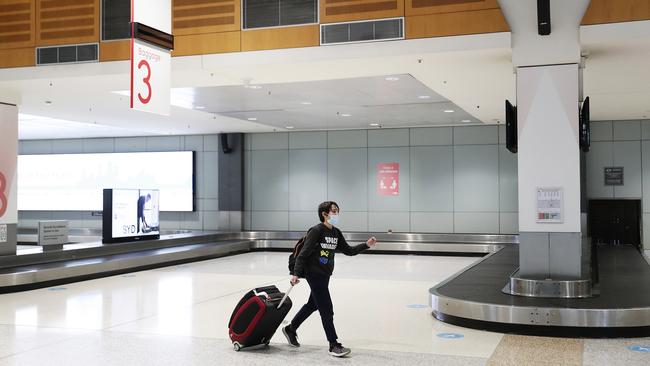
- Lockdowns a ‘clear setback’ for banks: UBS
- Woolworths to close Vic fulfilment centre
- Alcoa hit with $921m tax bill
- Premier Investments shuts Melb’ stores
Welcome to the Trading Day blog for Wednesday, July 8. The ASX closed down 1.5pc at its lowest levels in a week, dragged down by the big banks after loan deferrals were extended for an additional four months, and as retailers shut stores in Melbourne ahead of the city’s Stage 3 lockdown.
US futures suggest a further weakness to come tonight while the Aussie dollar is trading down 0.2pc to US69.34c.
8.05pm: HK emerges as tech trading hub
Hong Kong is becoming an active center for trading stock in some of China’s largest technology groups, bolstering the case for more secondary listings of US-listed Chinese companies.
The city now accounts for nearly a fifth of the shares changing hands by value in Alibaba Group Holding Ltd., after the e-commerce giant’s Hong Kong listing in November, FactSet data show.
Since NetEase Inc. and JD.com Inc. made their debuts in Hong Kong last month, their Hong Kong shares have accounted for about 33% and 21%, respectively, of total turnover by value, according to FactSet. The proportions for NetEase and JD.com could decline over time given that trading volumes tend to spike when a new company comes to market. All three companies already had American depositary receipts in New York.
The solid turnover signifies keen interest from individuals and institutions alike, which could make it more appealing for other companies to follow suit. It also means extra business for Hong Kong Exchanges & Clearing Ltd. and the city’s brokerages. In May, Alibaba was the second most heavily traded stock in Hong Kong after Tencent, according to the city’s stock exchange.
The secondary listings so far, and a likely wave of further deals, have helped bolster confidence in Hong Kong’s future as a capital-raising center, at least for Chinese companies. That comes even as Beijing’s imposition of a tough new security law has raised broader concerns for international business in the city.
Dow Jones Newswires
7.47pm: ‘Significant doubt’ over AirAsia
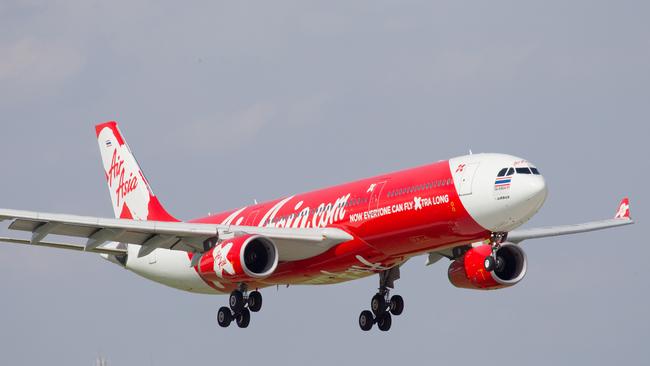
The future of top regional budget carrier AirAsia is in “significant doubt” due to the collapse in demand for air travel caused by coronavirus, its auditor warned, sending its share price tumbling 18 per cent on Wednesday.
The aviation industry is facing its biggest-ever crisis due to the pandemic, with airlines worldwide laying off huge numbers of staff while some have already gone out of business.
AirAsia, led by colourful chief executive Tony Fernandes, pioneered low-cost air travel across Asia in the early 2000s at a time of growing demand from a fast-emerging middle class.
But on Monday the debt-laden Malaysian airline reported a record quarterly loss of 803 million ringgit ($US187 million) for the first three months of the year, after being forced to ground its fleet due to the virus.
Auditor Ernst & Young said Tuesday that “travel and border restrictions implemented by countries around the world has led to a significant fall in demand for air travel which impacted the group’s financial performance and cash flows”.
It noted the “existence of material uncertainties that may cast significant doubt on the group’s and the company’s ability to continue as a going concern”, in an unqualified audit opinion statement to the Kuala Lumpur stock exchange.
The airline was already facing stiff competition from other low-cost carriers before the outbreak, and had reported a net loss of 283 million ringgit in 2019.
AFP
7.31pm: Gold tops $US1800oz
The price of gold reached above $US1800 an ounce Wednesday for the first time since 2011, with the precious metal benefiting from its haven status in times of economic turbulence.
Gold hit $1,800.86 an ounce around 0830 GMT on the London Bullion Market, the highest level in eight and a half years
AFP
Samantha Bailey 5.12pm: Second wave weighing on ASX
The local sharemarket finished Wednesday’s session firmly lower in what was the first three-day fall since mid-June.
At the close of trade, the ASX benchmark S&P/ASX200 had lost 92.623 points, or 1.54 per cent, to 5920.301 points. The broader All Ordinaries index had lowered 92.432 points, or 1.51 per cent, to 6034.301 points.
“The market is definitely still trying to price-in the potential economic impacts of Victoria’s lockdown,” said IG market analyst Kyle Rodda.
“As has wont to be the case during the COVID-19 crisis, a big sell-off in consumer discretionary and real estate sector stocks, and to a lesser extent, the banks, reveals a market clearly disturbed the increasing uncertainties brought about by something of second-wave of the pandemic in Australia.”
Wednesday’s losses came after the index posted a four-day winning streak last week, hitting a three-week high of 6101.4.
Shares in the major banks dropped on news loan deferrals had been extended through to March 2021.
In financials, NAB fell 2 per cent to $17.98 while ANZ backtracked 2 per cent to $18.41. Westpac stepped back 1.8 per cent to $17.84 while Commonwealth Bank lost 1 per cent to $70.56.
BHP slid 1 per cent to $35.75, while Rio Tinto slipped 0.8 per cent to $95.54. Fortescue shed 0.9 per cent to $14.67.
Telstra grew 0.6 per cent to $3.42.
Aluminium producer Alumina slumped 7 per cent to $1.59 after its jointly-owned smelting unit was hit with a $921m tax bill relating to alleged transfer pricing.
Gold miners made gains after gold futures hit an eight-year high on Tuesday night.
Saracen gained 1.8 per cent to $6.14 while Newcrest lifted 0.1 per cent to $33.12. Evolution Mining added 1.3 per cent to $6.00.
Northern Star put on 6.5 per cent to $14.84 after announcing to the market that it would pay the interim dividend it postposed in March due to COVID-19. The company posted a 40 per cent lift in the value of its cash, bullion and investments for the June quarter.
Sydney Airport lost 1.5 per cent to $5.41 on the back of news that a virus breach occurred when a planeload of Jetstar passengers from Melbourne left Sydney Airport without being screened because health workers were busy with another airline.
Transurban slumped 3.8 per cent to $13.67 after RBC analysts singled out the toll road operator, along with Sydney Airport, as companies among the hardest hit by the Stage 3 lockdown in Victoria.
Vicinity Centres slumped 3.7 per cent to $1.32 after a Morgan Stanley analyst said it was the most Victoria-exposed REIT in a note to clients.
Mirvac lost 2.7 per cent to $2.18 while Scentre backtracked 1.4 per cent to $2.12. Dexus fell 1.1 per cent to $9.12.
Meanwhile, buy now, pay later platform Splitit jumped 8.4 per cent to $1.48 after it announced record growth for the second quarter. Shares in the company hit an all-time high of $1.70 at the open.
The Australian dollar was trading 0.2 per cent lower at US69.32c in late trade.
4.33pm: Gold, supermarkets outperform
A fresh wave of panic buying and flight to safe haven stocks boosted gold and supermarkets in Wednesday’s session, as investors weighed the economic hit of new lockdowns in Melbourne.
As Melbourne prepared for stage three lockdowns this afternoon, including clearing of stock from supermarket shelves – all three of the listed supermarket chains outperformed.
Coles added 2.42pc to $17.79 as Metcash added 2.2pc to $2.78 and Woolworths rose 1pc to $38.22.
Gold miners meanwhile cheered a lift in futures to eight-year highs – Perseus adding 5.6pc to $1.41 and Northern Star the best of the day with a 6.5pc gain to $14.84 after reinstating its interim dividend.
Here’s the biggest movers at the close:
4.11pm: Virus spread sends ASX to daily low
Melbourne’s Stage 3 lockdown loomed large over the market on Wednesday, sending the benchmark ASX200 to its worst levels in a week.
After clawing gains in midday trade, the benchmark ASX200 took a sharp turn lower in afternoon trade – hurt by reports of three new COVID-19 cases in the ACT, the territory’s first cases in a month.
The index closed at its worst levels of the day, down 93 points or 1.54 per cent to 5920.3.
The major banks and CSL were drivers of the weakness, with a late slip into the red by heavyweight iron ore miners key in cementing the market’s weak close.
3.40pm: Lockdown 2.0 a boon for supermarkets
While retail stocks take a hit from the latest lockdown in Melbourne, listed supermarket giants are surging again.
Both Woolworths and Coles are bucking the broader market pessimism as they reinstate buying limits at their Victorian stores and brace for further panic buying.
Woolworths shares are up by 1.1pc to $38.27, while Coles jumps 2.8pc to $17.85. Independent grocer Metcash is higher by 2.6pc to $2.79.
Recall all three groups recorded a significant surge in sales at the start of the first lockdown as panic buying cleared shelves across the country.
Read more: New cases shut Woolies warehouse
Bridget Carter 3.35pm: BHP taps Goldmans for oil review
DataRoom | Australian listed mining giant BHP is understood to have tapped investment bank Goldman Sachs to assess options for its oil and gas joint venture in the Gippsland Basin, estimated to be worth at least $US2 billion.
The appointment offers further credibility to the view that BHP is a seller, or is at least seriously assessing a divestment of the asset.
However, any sale, say sources, would only likely occur once its joint venture partner Exxon has concluded its sales process for its share of the assets, which is expected to start around August or September through JPMorgan.
Goldman Sachs has been close to BHP for some time, advising on its demerger during 2015 of South32 and some in the market believe that the mandate for the North American bank could in fact extend to examining the interest BHP holds across its Australian portfolio.
In September last year, when its Gippsland joint venture partner Exxon confirmed that it was selling out of the project, many predicted that the $106bn BHP would also stage an exit.
Read more: BHP sparks talk of oil asset sale
David Swan 3.25pm: Apple closing all Victorian stores
Tech giant Apple is closing all five of its Victorian stores from Thursday, due to what it says is an “abundance of caution” as Melbourne’s stage-three restrictions come into effect.
The company had already closed its Highpoint store due to its location in a COVID-19 ‘hot spot’, and will now close the remaining stores from midnight.
“Due to current COVID-19 conditions in some of the communities we serve, we are temporarily closing stores in these areas,” an Apple spokeswoman told The Australian.
“We take this step with an abundance of caution as we closely monitor the situation and we look forward to having our teams and customers back as soon as possible.”
Apple had closed each of its Australian stores in February as COVID-19 hit, and reopened them recently mandating temperature checks and masks for every customer.
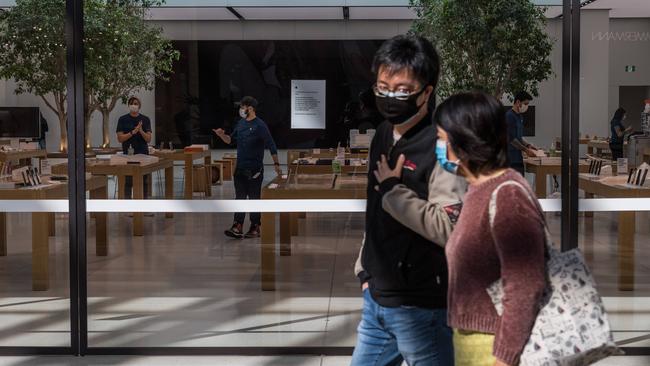
3.01pm: Premier Investments shuts Melb’ stores
Retail group Premier Investments, owner of Smiggle, Peter Alexander and Just Jeans, says it will shut all of its Melbourne metro stores, as the city moves into stage 3 lockdowns from tonight.
In a statement, Premier said its stores across 36 shopping centres and seven strip malls were “clearly not an essential service”, and would close in line with the government’s direction, but its regional stores would continue to trade as normal.
The Solomon-Lew headed group said it did not intend to pay any rent at those stores affected by the lockdown, reigniting the same battle it waged with landlords in the first lockdown.
“Our distribution centre and support office will remain open and we will continue to adhere to the COVID-19 safe operating processes we have been practising over the past few months,” the company said.
PMV last traded down 4pc to $15.99 – still well above its $8.13 low at the initial onset of the pandemic.
Read more: Malls mauled as giants join rent rebellion
2.54pm: Lockdowns a ‘clear setback’ for banks
Melbourne’s COVID-19 outbreak and subsequent lockdown is a “clear setback” for banks, even as he tips a sharp reduction in credit impairment charges in their second half results, according to UBS.
Banking analyst Jon Mott notes loan loss charges are then expected to rise again in FY21 as the level of policy stimulus is reduced and the banks are forced to treat many of these exposures as impaired.
He cautions that if the outbreak spreads outside Victoria and especially to NSW, requiring more of the country to go into lockdown, then banks FY21 earnings and dividend recovery are “at risk”.
“We continue to have a positive view on the banks given expectations for a recovery in return on equity to 9 per cent and increase in the payout ratio,” Mr Mott says. “This remains our base case despite this setback.”
An extension of loan deferrals announced today is “broadly in line” with his expectations, even with a “material setback” from Melbourne.
He notes that city accounts for only 20pc of Australia’s population and GDP, but 40pc of Australia’s GDP growth in 2019.
Read more: Market starts to worry about dud loans
2.34pm: ACM mulls printing centre closures
Regional news producer ACM says its in talks with employees of its printing sites as it plots the future of the assets, noting some print closures were likely.
The group, owned by former Domain boss Antony Catalano, said economic challenges brought by the COVID-19 pandemic had forced the review, adding to stress as many community newspapers moved to digital-only publication from last week.
“With the suspension of these external printing clients along with our own product stand downs, ACM no longer has the volume of printing to warrant the number of print centres in its stable,” the company said.
The group owns four printing sites in Albury, Ballarat, Canberra and Murray Bridge.
“While the proposal is likely to result in some print site closures it is proposed that this will result in a business model to ensure the sustainable long-term future of our highly valued mastheads.
“The proposed closure of these plants will remove a heavy cost burden and more importantly remove a capacity that is no longer required by our business.”
Read more: ACM to resume publishing suspended regional papers
David Ross 2.28pm: Wagners to appeal Boral judgment
Building products group Wagners has announced it would appeal the recent court judgment that found in favour of Boral in a rift between the two regarding cement prices.
In a notice posted to the ASX, the Queensland-based firm said after consideration of the orders from the court and the reasons for its judgment it had decided to appeal certain aspects of the decision.
“We strongly believe the court has erred in some of the orders made and in its reasoning,” Wagners CEO Cameron Coleman said.
“We need given the long term nature of the agreement we need to be very clear on the operation of the particular clauses under consideration.”
However, he said Wagner did not believe any resolution to the matter would be arrived at soon.
WGN last traded up 1.5pc to $1.02 while BLD trades down 1.9pc to $3.67.
Read more: Boral the victor in cement price war
2.23pm: ACT virus cases add to share weakness
Reports of three new COVID-19 cases in the ACT is weighing on the market going into the last hour, sending shares to new lows.
The benchmark extended its intraday fall to a loss of 63 points or 1.1 per cent to 5949.6.
The new cases in the nation’s capital are linked to Melbourne’s outbreak and are the first ACT cases in a month.
Read more: ‘We are all Melburnians now’: Morrison
2.07pm: ASX falls to 4-day low
Australia’s share market is underperforming regional markets again due to the worsening coronavirus pandemic in Melbourne.
The S&P/ASX 200 fell 0.7pc to a 4-day low of 5966.6, despite a 0.3pc rise in US futures.
The Australian market is the worst in the Asia-Pacific for a fourth day running, as a 6-week lockdown of Melbourne threatens the outlook for the economy, earnings and dividends.
The Real Estate sector is worst off, with Goodman, GPT, Mirvac and Vicinity down 2.7pc to 3.2pc due to their exposure to Melbourne.
The four major banks are down 0.4pc to 1.5pc after extending a loan holiday – due to expire in September – until January.
Among other Melbourne-exposed stocks, Domain fell 9.5pc and Crown fell 1.5pc.
1.41pm: Retail catalysts unwinding: Macq
The recent spike in retail demand is at risk of unwinding as stimulus dries up and consumers spend more on services instead of goods, according to Macquarie.
The broker switches its preference to Staples from Discretionary stocks, noting the short-term catalysts of national lockdowns were coming to an end, noting “the early wins from holding these names are likely to have already occurred”.
“Crowded malls and increasing spend in discretionary areas such as apparel and restaurants are flattering the image of retail spend, but we note that consumers going out more means they are staying home less, diverting spend away from the elevated household goods segments,” analysts at the bank say.
“As the world and consumer settings return to a more normal setting over the next couple of
years, so too will spending patterns. This suggests that using FY20 or FY21 as a base year for calculating sustainable earnings and valuation is likely to lead to disappointment.”
They downgrade Wesfarmers to Neutral, noting supply chain challenges at Kmart and Target, along with a cut to JB Hi-Fi and Domino’s.
1.16pm: Syd Airport to take lockdown hit: RBC
The lockdown in metropolitan Melbourne is likely to hit Sydney Airport and toll road operator Transurban hardest, according to RBC.
Analyst James Nevin notes that the Sydney to Melbourne flight route represents about 34pc of domestic traffic for Sydney Airport in a normal year – the world’s second busiest route – and most of which will be put on hold as the border between states is closed.
In addition, he notes that Melbourne could see a 25pc to 30pc fall in first half traffic as a result of the six-week lockdown, with traffic already down 8pc for the first half before the latest restrictions were introduced.
SYD last traded down 0.55pc to $5.46 while TCL is lower by 2pc to $13.93.
1.02pm: Shares bounce from daily lows
Shares have bounced from their lows but remain lower by 0.41 per cent at lunch, as the major banks continue to drag.
At 1pm, the benchmark ASX200 is lower by 24 points to 45988.5.
Commonwealth Bank is holding minimal gains, while the rest of the big four are lower by between 0.8pc to 1pc – trimming earlier losses as much as 1.7pc.
Elsewhere, discretionary and real estate stocks are taking a hit as Melbourne’s new lockdown threatens mall traffic and sales recovery.
Here’s the biggest movers at 1pm:
David Ross 12.39pm: Woolies to close Vic fulfilment centre
Woolworths will close its entire West Footscray Customer Fulfilment Centre after two more workers at the site tested positive for COVID-19.
These cases come after a supervisor who last worked at the site on Wednesday last week tested positive to COVID-19.
“As a precautionary measure we have made the decision to temporarily close the site so we can undertake testing of all team members,” a spokesman said.
“We have also asked our team to self-isolate while they wait for their results.”
The site closure is not expected to impact online deliveries as had happened earlier in the week.
WOW last traded up 1.7pc to $38.50.
Read more: Supermarkets limit milk, bread, eggs as panic returns
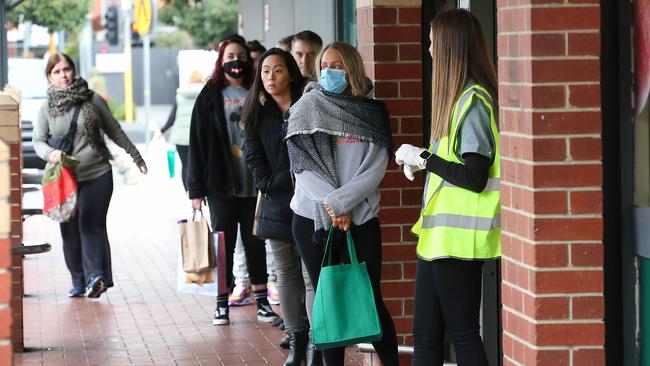
12.21pm: PayPal exec joins Sezzle
Former PayPal exec Veronica Katz has joined buy now, pay later group Sezzle, as the group shuffles leadership and promotes co-founder Paul Paradis to president.
A day after unveiling strong growth for the June quarter, Sezzle said it had created a new role for Mr Paradis as president, broadening his responsibilities beyond merchant acquisition to focus on expansion in new markets and the group’s core strategic initiatives.
In his place, Ms Katz – former VP of global accounts at PayPal – will take on the chief revenue officer role.
“Sezzle has an impactful product, an amazing mission-driven company culture, and incredibly talented people,” she said.
“There is a lot of synergy with this new role and my previous responsibilities at PayPal – I
will definitely be hitting the ground running.”
SZL last down 0.8pc to $5.03.
Read more: Sezzle thrives in the pandemic
12.07pm: Victoria bonds lag, confidence remains
Treasury Corp Victoria bonds have underperformed against other states in response to the worsening pandemic and lockdown of Melbourne.
The yield spread between 10-year bonds issued by TCV and NSWTC has hit a more than 2-month high of 0.44bps this morning from -0.13bps yesterday.
The situation in Victoria “creates upside risks for the borrowing tasks of both the TCV and the AOFM”, according to ANZ economists, led by David Plank.
“TCV bonds cheapened on the news and we think there is scope for this to continue, with TCV possibly trading flat to WATC (WA Treasury Corp) across the curve.”
They also note that the lockdown increases the likelihood of additional fiscal stimulus from the federal government.
“This may lead to underperformance of 10y ACGBs on a cross-market basis and keep swap spreads narrow.” But interestingly they have continued to digest some very solid issuance, with $300m of new 2042 bonds issued yesterday.
“It suggests a degree of confidence in their name,” says CBA’s head of fixed income and FX strategy, Martin Whetton.
TCV has previously projected a funding requirement of between $20bn to $24bn. This represents a combination of $10-14bn in additional funding and the previously advised 2020-21 funding task of $10.2bn.
Meanwhile Credit Suisse macro strategist, Damien Boey, says the Melbourne shutdown “poses much more risk than policy makers think.”
Rather than the $6bn or 0.3pc GDP hit from a 6-week shutdown forecasts by officials, he forecasts a 1.3pc hit.
11.47am: Shares fight to flat
Shares have fought back to trade flat in the second hour of trade, with strength in staples and materials buoying the index.
After an earlier slip as much as 0.54pc, the benchmark ASX200 is now lower by 3 points to 6010.
Commonwealth Bank has regained all of its losses to trade higher by 0.15pc, but the rest of the majors are still lower by between 1.1pc and 1.4pc.
Telstra is higher by 2pc, while gold miners are cheering the eight-year high in gold futures overnight – Saracen up 2.6pc, Northern Star higher by 5.7pc and Evolution higher by 2.6pc.
11.37am: Victorian debt levels to soar: S&P
Victoria’s debt levels are set reach more than double of its operating revenues in 2022 as the state grapples with a new six-week lockdown, so says S&P.
The ratings agency notes that the new regulations to stop the spread of coronavirus across metro Melbourne will delay the state’s economic recovery as payroll taxes, stamp duties, GST and health expenditures are weakened.
S&P forecasts debt to reach 117pc of operating revenues in 2022, up from 65pc in 2019, but maintains its AAA rating on the state given the government’s commitment to fiscal discipline.
“We could lower our rating on Victoria if the COVID-19-related economic disruption is more prolonged than we currently expect or if we believe the state’s financial management is weakening,” it said.
“This would delay Victoria’s fiscal recovery and weaken its financial position further, compared with our forecasts.”
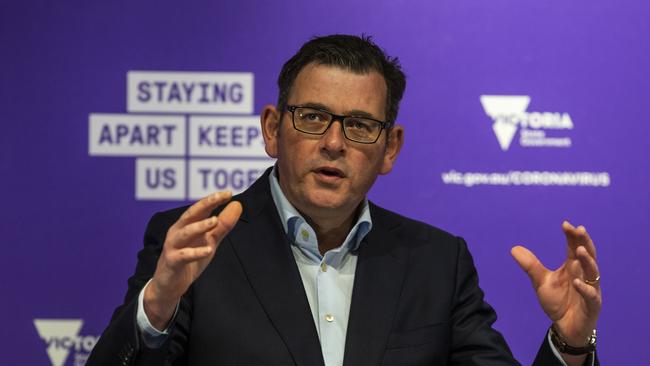
11.22am: Australia sells $2bn of 2030 bonds
The Australian government has sold $2bn in bonds set to mature in 2030 at an average yield of 0.8759pc with demand of more than three times the offer.
The latest treasury tender sold $2bn in May 2030 bonds to 18 successful bids, amid demand of $7.3bn.
The lowest yield accepted was 0.8725pc, and highest of 0.8775.
11.14am: Alumina shares take hit on tax bill
Alumina shares are the worst performing in morning trade, after its jointly-owned Australian smelting unit was hit with a $921m tax bill.
The group said it would fight claims by the ATO relating to alleged transfer pricing by Alcoa of Australia.
Back in February the group said it was facing a $212m tax bill, but the ATO today claimed ti was owned $214m in back taxes, plus interest worth $707m.
AWC shares last down 5.4pc to $1.62.
Read more: Alumina hit by $921m tax bill
11.04am: Which REITs have most Vic exposure?
Morgan Stanley’s Simon Chan notes that Vicinity Centres is the most Victoria-exposed REIT with 46pc of its rental income derived from Melbourne centres, and set to be hit as the city moves to Stage 3 lockdowns.
Not far behind, GPT has 44pc of its retail assets and 31pc of its office assets in Melbourne, while Mirvac has 29pc of its office portfolio and 2.8pc of its retail portfolio in Melbourne.
In the past 4 days, Vicinity shares are down 6.4pc, GPT is down 2.7pc and Mirvac is down 5pc.
Scentre is the least exposed to Victoria, with 15pc of its income derived from Melbourne malls.
Dexus has 15pc of its office assets in Melbourne and Stockland has 10pc of its malls in Melbourne, albeit the city contains 33pc of its residential business.
10.59am: ‘New phase’ of support coming: Treasurer
Australian Treasurer Josh Frydenberg has flagged a “new phase” of income support for people impacted by the coronavirus crisis when he delivers his economic and fiscal update.
Mr Frydenberg tells Seven Network another phase of temporary and targeted support will be announced on July 23.
This offers the potential for more stimulus to ease the looming “fiscal cliff” when current programs end in September.
Perhaps “bad news is good news” in terms of potential stimulus after NSW-VIC border closure and 6-week lockdown of Melbourne announced this week.
But this news has done nothing to stop the current pullback in the Australian dollar and shares.
AUD/USD hit an intraday low of 0.6934, down 12 points since the NY close.
The S&P/ASX 200 shares index has fallen 0.5pc to an intraday low of 5985.
The Morrison Government is continuing to provide support to Victorian families & businesses with an unprecedented amount of fiscal support during this difficult time.
— Josh Frydenberg (@JoshFrydenberg) July 8, 2020
We will continue to do more & ensure support gets to the people who need it most. pic.twitter.com/ySz9EChLuT
10.34am: Splitit leaps higher on record growth
Buy now, pay later platform Splitit, the $556m company which recently inked a deal with Mastercard, has reported record growth in the second quarter, prompting a jump as much as 20pc in early trade.
The group said merchant sales volume was up 260pc versus the previous year to $US65.4m, a 176pc lift from the prior quarter.
The platform now has 309,000 unique shoppers, with 1000 merchants, while average order value is at $US893.
SPT shares hit highs of $1.70 at the open, and last traded up 13pc to $1.54.
Read more: Splitit soars 50pc after Mastercard pact
10.11am: Shares slip as banks slide
Shares are edging lower in early trade under the weight of the major banks as they extend loan deferrals to help struggling customers.
At the open, the ASX200 is lower by 10 points or 0.17 per cent to 6002.9 – as financials decline by 1pc.
Commonwealth Bank is lower by 1pc, NAB by 1.8pc, Westpac by 1.6pc and ANZ by 1.5pc.
Elsewhere, Afterpay is slipping 2.4pc to $66.35 after completing its $650m institutional placement at $66 apiece, while gold miners are leading gains.
10.04am: Afterpay completes $650m placement
Afterpay shares will return to trade on Wednesday, after raising $650m in an institutional placement.
The buy now, pay later group raised the funds at $66 apiece, with a $150m share purchase plan to follow.
“The market has responded strongly to our aspiration to further accelerate our investment in growing underlying sales and expanding our global footprint, with the placement being oversubscribed,” director Elana Rubin said.
“We are very pleased with the support we have received from our existing shareholders and we welcome our new investors to the register.”
Read more: Has the market got Afterpay right?
Samantha Bailey 9.57am: Northern Star reinstates 7.5c dividend
Northern Star Resources will pay out a 7.5c per share interim dividend to shareholders as it posted a lift in free cash flow thanks to a surge in the price of the yellow metal.
The miner posted a 40 per cent lift in the value of its cash, bullion and investments in the June quarter to $769.5m, compared to $551.4m in the March quarter, prompting the reinstatement of the $55m shareholder payout after it was postponed due to COVID-19.
Still, the gold miner missed the lower end of its sales and production guidance for the 2020 financial year by 1.6 per cent, though it had previously been withdrawn at the onset of the pandemic.
Northern Star said sales for the year totalled 900,388oz while gold produced totalled 905,177oz.
The company said it had drawn down an additional $200m in debt in the March quarter, but had repaid the sum earlier this week, to take its corporate debt to $500m.
“The health and safety of our people and the communities in which we operate is always our first objective and the measures we adopted in response to COVID-19 reflected that,” chief executive Bill Beament said.
“As we foreshadowed at the time, these measures incurred additional costs, reduced productivities and restricted production. We also adopted a prudent approach to managing our balance sheet, as reflected in the decision to postpone the interim dividend and drawdown the additional debt.”
Read more: Coronavirus hits Northern Star production
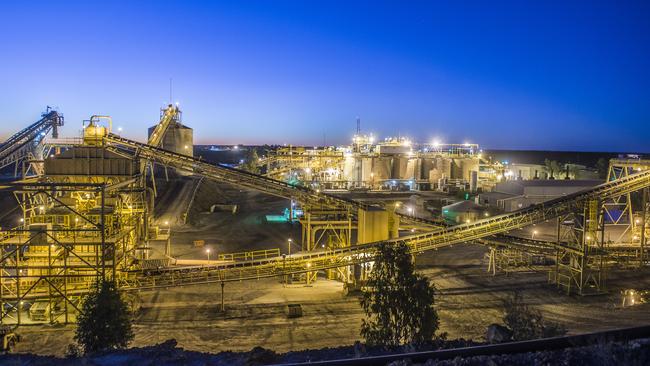
9.45am: Select Harvest exports ‘near normal’
Almond grower Select Harvest says its crop volumes for the year are set to be slightly higher than last year, with exports levels almost back at pre-COVID-19 levels after a significant hit.
The group said its harvest had been completed, and crop volume was expected to be 23,000 MT, higher than the 22,690 MT processed last year.
As restaurants and cafes have been closed due to COVID-19, Select said it had shifted its products in the domestic market to retail, while export customers were now taking shipments at near normal levels.
Still, the group warned a lift in the US crop and challenges to market access have resulted in aggressive selling, resulting in softening of prices.
It said its 2020 crop was over 80pc committed at prices in the range $7.25 to $7.75 per kilo.
In April, the Australian Almond Board reported a 72pc collapse in almond exports to India, and 16pc decline to Europe.
9.40am: What’s on the broker radar?
- Afterpay target price raised 8pc to $27: UBS
- Afterpay target price raised 25pc to $81.25: Bell Potter
- Afterpay target price raised 94pc to $70: Macquarie
- Coca-Cola Amatil cut to Neutral: Credit Suisse
- Domino’s Pizza cut to Neutral: Macquarie
- JB Hi-Fi cut to Neutral: Macquarie
- Nickel Mines rated new Buy: Shaw and Partners
- Rio Tinto cut to Neutral: Goldmans
- Sandfire Resources cut to Sell: Goldmans
- Wesfarmers cut to Neutral: Macquarie
9.26am: Risk aversion to send ASX lower
A pullback in Australian shares should continue for a third day running as caution about the economic impact of second-waves of coronavirus sparked risk aversion in global markets.
US 10-year bond yields fell 4bps to 0.64pc, spot gold rose 0.6pc to $US1784.86 and the S&P 500 fell 1.1pc to 3145.3 points, sending the VIX index up 1.5bp to 29.43 per cent.
The VIX is bouncing off its 200-day moving average again as it did when the S&P 500 fell 8.3pc and the S&P/ASX 200 fell 7.7pc in early June before the Fed arrested the sell-off by easing access to its corporate bond buying.
Also, while economic data have been stronger than expected, Citi’s US Economic Surprise index is now at a record high and unlikely to go much higher.
While questions are being asked about the pace of recovery, the moves overall are far from risk-off and looks more like consolidation with markets still largely in “wait and see mode” ahead of the upcoming earning season later in July, says NAB’s Tapas Strickland.
“Virus news remains mixed with lockdowns reimposed in Melbourne, but in the US rising hospitalisation rates are so far not translating into a pick-up in deaths,” he says.
He notes that US analysts are tentatively concluding that if healthcare systems are proving resilient, there’s less need for restrictions.
There may be a case for further underperformance of Australian shares given the NSW-VIC border closure and 6 week lockdown of Melbourne.
Offsetting that is the potential that “bad news is good news” in that VIC lockdowns could lead the federal government to extend aspects of JobKeeper and Jobseeker in its July 23 economic update.
On the charts, a sustained move below 6000 points could see a dip to the apex of the recent bullish pennant pattern at 5810, but this pattern could yet drive the market higher in coming days.
The ASX200 fell 1.7 points to 6012.9 on Tuesday.
9.17am: New Pengana trust fields solid demand
Pengana says its new private equity trust has received significant demand in its rights issue, well exceeding its $68m offer amount.
“Significantly, the unit price of the Trust traded at a premium to its net asset value per unit throughout the offer period,” the group said.
“This is extremely unusual and further indicates the support PE1 enjoys from both existing and new investors.”
Chief Russel Pillemer said the offering was unique, and had the potential to significantly improve investors’ portfolios.
Read more: Pengana offers investors entry to private equity
9.08am: Super Retail entitlement offer raises $44m
Super Retail has raised $44m from retail shareholders after its institutional placement, total capital raised to $203m.
The group said this morning it had completed its 1 for 7 pro-rata entitlement offer, where shares were offered at $7.19 apiece.
Eligible shareholders subscribed for 4.18m new shares, representing a take up rate of 69pc of the new shares available under the offer, with the rest to be allocated to sub-underwriters.
“We will continue with the execution of our corporate strategy, which has proven resilient during COVID-19,” chief Anthony Heraghty said.
“The strong performance of the Group during this challenging period has reinforced our confidence in this strategy and our resolve to continue to strengthen our omni-retail capabilities.”
Read more: Super Retail raising $203m
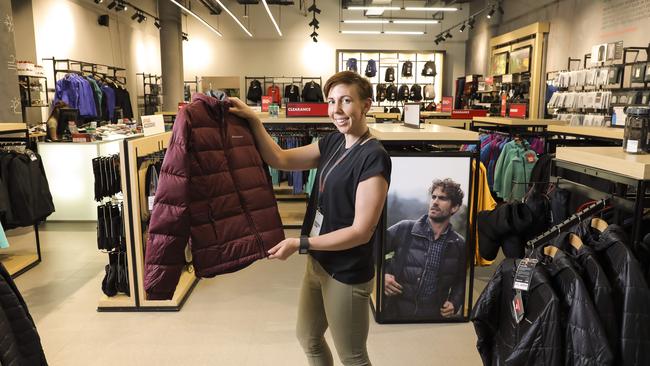
Nick Evans 8.45am: Alcoa hit with $921m tax bill
Alumina’s jointly-owned Australian smelting unit has been hit with a $921m tax bill including interest payments following an investigation by the Australian Taxation Office into transfer pricing in respect to sales made by the Alcoa of Australia business over two decades.
Alumina disclosed last year the Alcoa business had received a tax assessment of $212m, excluding interest and penalties. An internal review of the figure by the ATO and released by Alumina on Tuesday concluded the figure now stood at $214m.
In addition a statement of audit position by the ATO also includes additional claims for compounded interest on the primary tax amount totalling approximately $707m.
Alumina is the 40 per cent owner of Alcoa of Australia with the balance owned by US-based Alcoa Inc. The venture operates the Portland aluminium smelter in Victoria.
Read more: Alumina hit by $921m tax bill
David Ross 8.15am: Supermarkets reimpose Vic limits
Woolworths and Coles have reimposed item restrictions at its Victorian supermarkets after a wave of panic buying swept the state on Tuesday.
Customers will be restricted to a limit of two items across at least 27 new product lines at Woolworths.
This comes on top of existing limits on sales of toilet paper.
Woolworths is restricting shoppers across a range of chilled and frozen meat, fish, pizzas and vegetables, milk and bread, pasta, tissues, bacon, hand sanitiser, rice and sugar.
Coles restrictions apply to prepared meat, eggs, bread, milk, pasta, flour, sugar, rice, soap, and toilet paper.
A Woolworths spokesman said the move was to ensure customers could access fresh food and essentials.
“We have more than enough stock flowing from our distribution centres into stores to support all our customers’ food and grocery needs,” they said.
Coles also announced measures this morning, putting restrictions on 20 items.
Coles CEO Steven Cain said while it was disappointing to reinstate purchase limits, it was an important measure to help manage demand for staple items at a critical time for many customers in Victoria.
“Our thoughts are with the many Victorians who will now be required to isolate at home, and we will continue to work with the state government to provide whatever assistance they need,” Mr Cain said.
“To help provide a safer shopping experience in our stores, we would ask that customers continue to treat our team members with respect, observe social distancing in stores, make use of the sanitising stations at the entrance, and plan their visit so they can be ‘speedy shoppers’.”
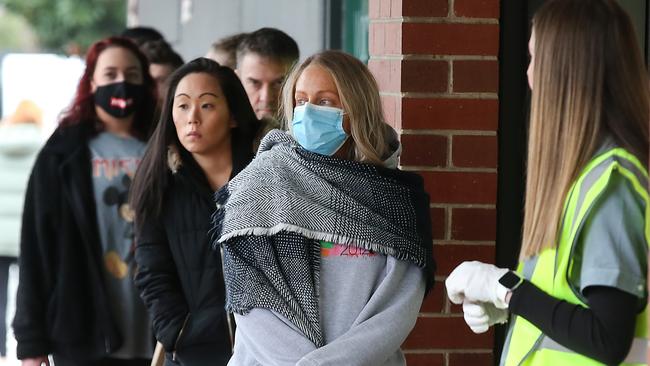
The reimposition comes after Woolworths and Coles removed most item restrictions across all of their supermarkets on Monday night.
Those restrictions were imposed in recent weeks in response to earlier of panic buying that broke out in response to new cases of COVID-19 in Victoria.
On Monday the supermarkets warned they would not hesitate to reimpose restrictions if shoppers again panic bought products.
7.30am: Ghosn ‘wired money to plotter’
Carlos Ghosn wired more than $US860,000 to a company tied to one of the two men being held in the U.S. on suspicion that they helped the former auto titan escape from Japan late last year, according to new court documents introduced by federal prosecutors.
The new documents come as the two men, a Massachusetts father and son, filed a fresh lawsuit seeking to be released on bail as they battle extradition to Japan for their alleged roles in the escape.
Michael L. Taylor, 59 years old, and his son Peter M. Taylor, 27, argued that they should be released on bail due in part to an outbreak of COVID-19 at the county jail where they are being held pending extradition. Thirty-six inmates at the county jail had tested positive for COVID-19 as of July 2, and one inmate died on that date, according to the new complaint, filed this week in U.S. District Court in Massachusetts.
Mr Ghosn, who was living in a court-monitored Tokyo house while facing financial-crime allegations from his time running Nissan Motor fled Japan late last year, smuggled inside a musical-equipment box onto a waiting private jet. US prosecutors said the Taylors were key participants in the plot, citing the Japanese investigation which included extensive video evidence of their movements in Japan.
Mr. Ghosn has denied the financial-crimes allegations in Japan and has said he fled the country because he wouldn’t receive a fair trial.
Dow Jones
7.25am: Levi’s to cut 700 jobs
Levi’s said it will cut 700 office jobs, or about 15 per cent of its worldwide corporate workforce, as it deals with a sharp drop in sales due to the coronavirus pandemic.
The San Francisco-based jeans maker said the lay-offs will save it about $US100 million a year and won’t affect workers at its stores or factories.
Like other clothing companies, Levi’s had to temporarily close its stores due to the virus. Many of the department stores that sell its jeans were also shut.
Levi Strauss & Co. said its second quarter revenue sank 62 per cent to $US497.5 million. It reported a loss of $US363.5 million, after reporting a profit a year ago. Adjusted losses came to 48 cents per share, beating Wall Street expectations, according to Zacks Investment Research.
The company said most of its stores are now open and seeing sales at about 80 per cent of where they were a year ago.
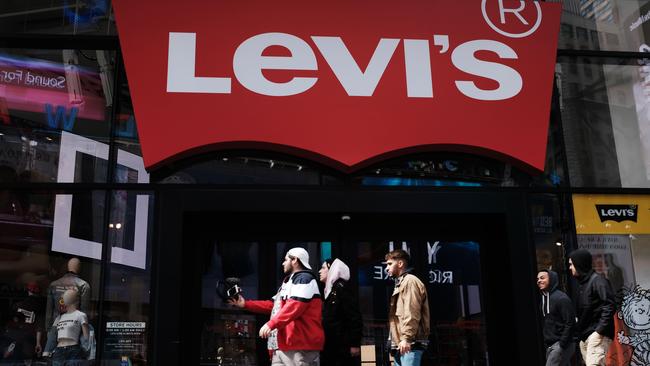
AP
6.25am: ASX to open lower
Australian stocks are set to slip at the open after global markets retreated amid gloomy economic forecasts.
After ending just two points down yesterday, more falls are expected today. At 6am (AEST) the SPI futures was down 34 points, or 0.6 per cent.
The Australian dollar at 6am was at US69.44c, down from US69.68c at yesterday’s close.
Spot iron ore prices were up 1.8 per cent to $US103.45.
6.10am: Wall Street reverses after rally
US stocks fell, pulling back after a recent rally, while gloomy economic forecasts suggested a recovery will be uneven.
The S&P 500 fell 1.5 per cent, snapping its five-session winning streak. The Dow Jones Industrial Average dropped 1.1 per cent and the Nasdaq Composite lost 0.9 per cent. All three indexes have risen more than 40 per cent from their March lows.
Shares of airlines were among the biggest decliners after United Airlines said reservations for travel within the coming month began to slide after new quarantine measures were put into effect. The carrier also warned employees to prepare to receive notifications of potential furloughs as soon as this week.
United fell 7.5pc, while Delta Air Lines dropped 5.1pc and JetBlue declined 4.6pc. Airlines are also lining up another $US25 billion in federal loans as they stockpile cash to weather a crisis that they have said will likely last years.
Elsewhere, Carnival fell 6.6pc after it cancelled a series of cruises planned for the fourth quarter of 2020 and beginning of next year due to the coronavirus and resulting delays at shipyards.
“We’re in this wait-and-see mode,” said Oanda analyst Craig Erlam, adding traders are seizing on encouraging economic data in the US and elsewhere, but continue to worry about the pandemic. “Every day, it seems always to be explained by optimism or anxiety,” he added, referring to the market’s moves
Investors are anticipating second-quarter earnings season, which will kick off later this month. Profits are expected to plunge 44pc, according to FactSet, but investors will likely focus on the outlooks for this year and next. Expectations are already very low, which could play into the market’s hands, Mr Erlam said.
Gold futures climbed above $US1800 for the second time in two weeks, settling at $US1804.20. That puts them less than 5pc from their 2011 record high of $US1888.70.
The gains come as investors worry about the growing disconnect between rising stocks and an economy still deep in recession, said ThinkMarkets analyst Fawad Razaqzada.
Overseas stocks were mainly lower as well. The pan-continental Stoxx Europe 600 slipped 0.6pc after reaching its highest level in nearly a month. Hong Kong’s Hang Seng index edged down 1.4pc, and Japan’s Nikkei 225 slipped 0.4pc.
Dow Jones Newswires
Joyce Moullakis 5.45am: Banks to extend loan relief
Australian banks have banded with regulators and the federal government to alleviate pressure over a looming financial cliff for struggling customers in September, outlining an extra four-month loan deferral period for those unable to restart payments.
The measures — which will be formally announced on Wednesday — provide more breathing space to those hardest hit by COVID-19, with as many as 779,458 loans on repayment pauses which amount to $236bn. The latest measures follow Victoria succumbing to a second wave of virus infections and imposing another lockdown.
5.40am: Palantir files for listing
The Silicon Valley data-mining firm Palantir Technologies confidentially filed to go public, setting up what could be the biggest stock offering from a technology company since Uber’s debut last year.
Founded in 2004 by investors including Peter Thiel, the company works with governments, law enforcement agencies and the defence establishment to organise and analyse huge volumes of data. The technology can be used to disrupt terrorist networks or battle human trafficking. Most recently, it was used by the White House to track coronavirus infections. Last year, Palantir won army contracts potentially worth hundreds of millions of dollars.
Palantir’s clients include major banks and the U.N.’s World Food Program.
The company has stirred controversy for upgrading Immigration and Customs Enforcement software that has been used in the Trump administration’s deportation crackdown, which led to on-campus campaigns to discourage recruitment and the picketing of CEO Alex Karp’s home.
The Palo Alto company has attracted venture capital from investors including In-Q-Tel, the Central Intelligence Agency’s investment arm. It has been weighing going public for years, with reluctance coming from the added scrutiny to the secretive nature of much of its business.
In a prepared release, Palantir said it had submitted its filing to the Security and Exchange Commission for confidential review and that a public stock listing is expected afterwards “subject to market and other conditions.”
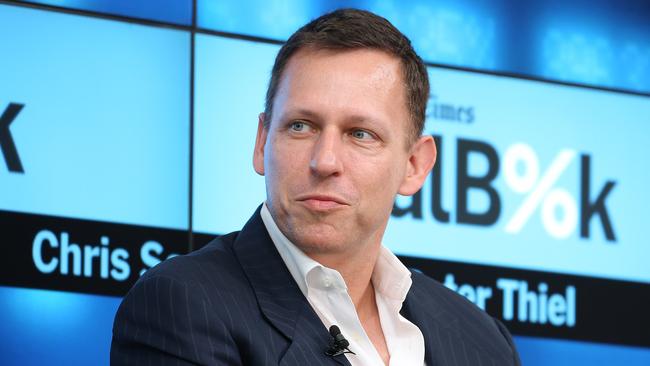
AP
5.37am: Oil prices swing
Oil prices swung between small gains and losses, extending a recent stall around $US40 a barrel ahead of this week’s data on U.S. crude stockpiles.
U.S. crude futures for August delivery finished the day down 0.1pc at $US40.62 a barrel on the New York Mercantile Exchange. That put prices just 3 cents off from last Thursday’s close.
The pause came ahead of data on weekly US crude stockpiles from the trade group American Petroleum Institute due out late Tuesday afternoon and Wednesday’s Energy Information Administration report. Last week’s data showed declines in U.S. crude inventories, suggesting the U.S. economy was in recovery mode and oil demand was rebounding.
Concerns that the rise in new coronavirus cases will hamper the recovery in fuel demand have weighed on oil prices in recent weeks.
Brent crude futures for September delivery, the global gauge of oil prices, fell 0.1pc to $US43.08 a barrel on the Intercontinental Exchange Tuesday.
Dow Jones
5.35am: Stocks sink as virus fears resurface
Stock markets fell as fears sparked by fresh lockdowns and bad economic news prompted profit-taking after strong gains the previous session.
European indices slipped after a pessimistic growth forecast by the European Commission which said the eurozone economy will contract by 8.7 per cent in 2020 due to the coronavirus crisis.
“Stocks in London and on the continent are lower as the EU Commission issues a bleak outlook for GDP growth, pouring cold water on the economic recovery narrative that had held sway over the past few sessions thanks to data from the US and China,” said Chris Beauchamp, chief market analyst at IG trading group.
Sentiment in Europe and US was also undermined by a bout of late selling in Chinese markets, although Shanghai managed a slightly firmer close.
European markets were up to 1.5 per cent lower at the close. London fell 1.5 per cent, Frankfurt sank 0.9 per cent and Paris slipped 0.7 per cent.
“Investors are pausing for breath,” observed Fiona Cincotta, analyst at City Index.
The easing of lockdown measures and reopening of economies has been the key driver of a months-long surge across equities, but a new surge of infections in several countries gave investors pause.
AFP
5.32am: Anger over US loans
A centrepiece of US President Donald Trump’s economic relief program was under renewed scrutiny following revelations it aided white-shoe lobbying firms and businesses linked to Kanye West and other billionaires.
Besides West’s Yeezy brand and law firms connected to famed trial lawyer David Boies and Trump defence attorney Mark Kasowitz, recipients of Paycheck Protection Program (PPP) loans included the PF Chang’s restaurant chain and businesses linked to several members of Congress, according to US media reports.
The controversy is the latest to befall the PPP, which was launched in April as a key job-saving program in the immediate wake of coronavirus shutdowns that shuttered countless businesses and led to tens of millions of lay-offs.
The program provides forgivable loans to coronavirus-impacted small businesses to cover employee salaries and some expenses.
AFP
5.30am: Deutsche fined over Epstein
Financial regulators in New York said they have fined Deutsche Bank $US150 million for failing to raise red flags on accounts held by tycoon sex offender Jeffrey Epstein.
The fine marked the first time a financial institution has been penalised for its dealings with the late financier, said the New York Department of Financial Services (DFS), an agency of the state government.
It said in a statement Deutsche Bank had failed to monitor Epstein’s account sufficiently closely, “despite ample information that was publicly available concerning the circumstances surrounding Mr. Epstein’s earlier criminal misconduct.”
Epstein, who was 66, hanged himself in Manhattan’s Metropolitan Correctional Center in August 2019 while awaiting trial on charges of trafficking minors for sex. He had pleaded not guilty.
AFP
5.25am: More US carriers to get loans
Five more US air carriers including Delta Air Lines and United Airlines will take out loans under the CARES Act stimulus package, Treasury Secretary Steven Mnuchin said.
The decision means most major US air carriers have agreed to accept financing from the $US2.2 trillion measure passed in late March to blunt the impact of the coronavirus pandemic.
“We welcome the news that Alaska Airlines, Delta Air Lines, JetBlue Airways, United Airlines, and Southwest Airlines have now also signed letters of intent,” Mnuchin said in a statement.
The CARES Act provided for $US25 billion to be lent to airlines. While carriers were initially hesitant to take the money for fear of draconian conditions, Treasury announced last week that American Airlines, Frontier Airlines, Hawaiian Airlines, Sky West Airlines and Spirit Airlines agreed to the government’s terms.
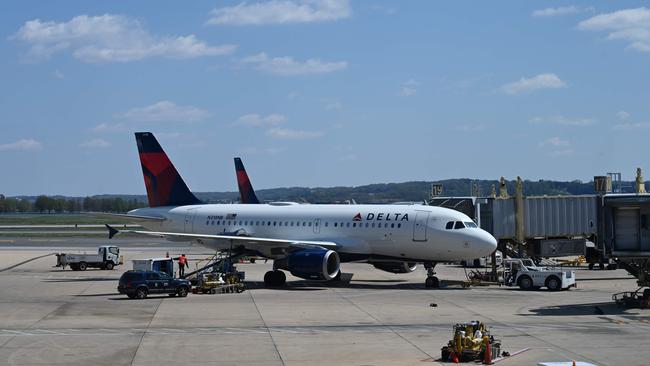
AFP
5.20am: UK readies £3bn recovery plan
British finance minister Rishi Sunak will on Wednesday unveil a mini-budget to help kickstart the UK economy following devastation wreaked by coronavirus fallout, featuring green investment worth £3.0-billion ($US3.7-billion).
Chancellor of the Exchequer Sunak hopes the plan will help to support more than 100,000 green jobs, including across the construction sector.
He will offer £2.0 billion in grants for households to insulate homes and make them more energy efficient, the Treasury said in a statement Tuesday.
Sunak will also provide £1.0 billion in green grants for public sector buildings, including hospitals, schools and social housing.
In England, the government aims to pay for at least two thirds of homeowner costs on green upgrades.
AFP



To join the conversation, please log in. Don't have an account? Register
Join the conversation, you are commenting as Logout